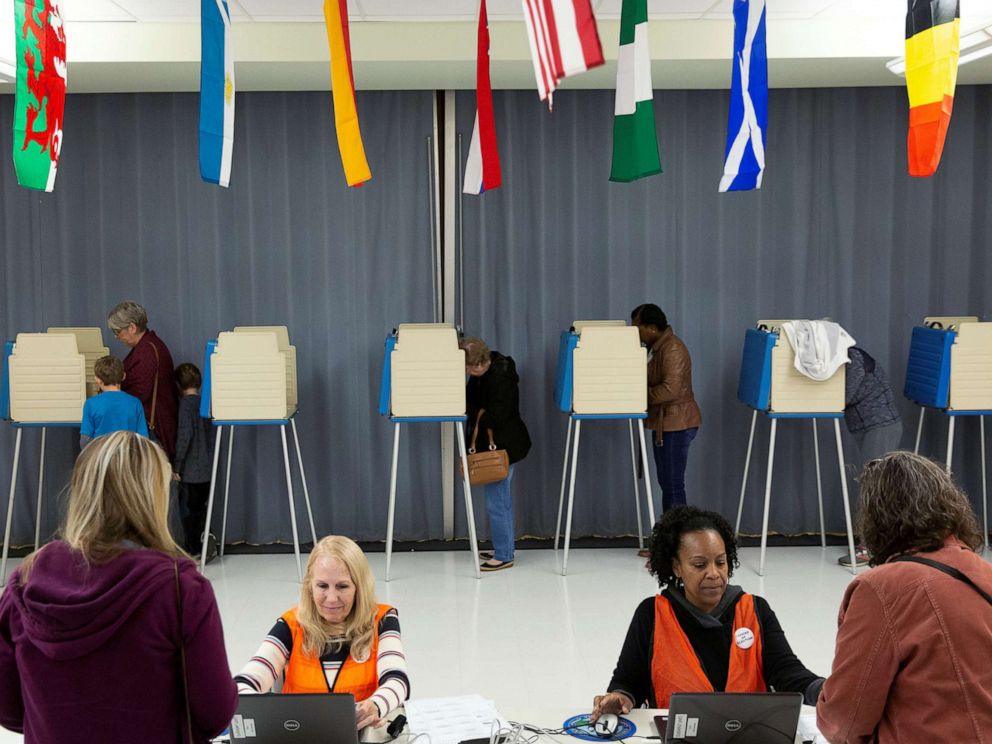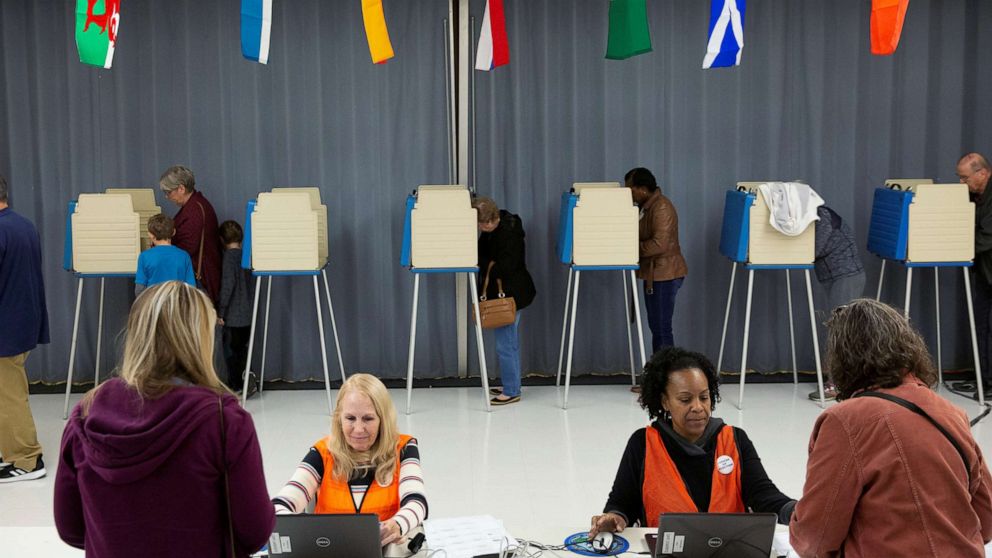[ad_1]
The revenge of the suburbs continues in the age of President Donald Trump.
On yet another Election Day, the president’s disruptive style and conservative policy pushes brought a clearly identifiable backlash.
On Tuesday, Democratic statewide and local candidates from Virginia through Kentucky, Iowa and Pennsylvania saw their vote margins boosted by suburban voters — and women in particular — overcoming the allure of Trumpism in a range of races.
The results cost Republicans full control of the state government in Richmond for the first time in a quarter century. They also left the GOP governor of Kentucky trailing a Democrat by some 5,000 votes — in a state Trump carried by 30 points in 2016.
The results serve as a counterweight to the unquestioned popularity of Trump inside a large swatch of his Republican base. It raises questions about Trump’s reelection, as well as the more immediate politics of impeachment, as Republicans confront a changed electoral landscape.
“The Trump presidency has generated a much deeper level of hostility that has been very helpful to Democratic candidates,” Stephen Farnsworth, a professor of political science and director of the Center for Leadership and Media Studies at the University of Mary Washington, told ABC News. “There are demographic changes in the suburbs … there’s more racial and ethnic and age diversity in the suburbs, they’re not as Republican as they used to be.”
“The results on Tuesday might well be seen as a warning sign for Republicans thinking about suburban voters and 2020 around the country,” he added.
Democrats see their wins as a blueprint for 2020, in races down the ballot and all the way to the top. Democratic National Committee Chairman Tom Perez said the results in Kentucky and Virginia in particular showed that Democrats can romp in cities and suburbs and even stay close in rural areas when they present their values in contrast to divisive Republicans.
“We competed everywhere, and we were competitive everywhere,” Perez told reporters Wednesday morning at a breakfast organized by the Christian Science Monitor. “When you continue to divide America, that is not only un-American, that is going to prove to be terrible politics for you.”
Perez said he was particularly gratified to see suburban women and young voters engaged in Tuesday’s elections. In Virginia, a major issue was legislative inaction to confront gun violence after a mass shooting in Virginia Beach earlier this year; in Kentucky, Republican Gov. Matt Bevin’s efforts to roll back Medicaid coverage was a key issue raised by Democrat Andy Beshear.
Election Day 2019 saw a continuation of trends that played out nationwide in 2017 and then particularly in the 2018 midterm races. Democrats last year captured a majority in the House with wins in suburban races not just outside New York, Philadelphia, Miami and Chicago, but around Memphis, Salt Lake City, Houston and Dallas.
A year later, with just a tiny sample of high-profile races on the ballot in off-year elections, Democrats swept into full control of state government in Virginia, which was a GOP stronghold barely a decade ago. They did that by running a diverse slate of candidates and doubling down on suburbs outside of Washington, D.C., picking up at least two key Senate seats in Northern Virginia and the state capitol that had long been held by the GOP. They also made significant House gains in the Tidewater in southeast corner of the state.
Meanwhile, in Kentucky, Beshear was able to run up the score in urban centers and surrounding areas, while keeping pace, just enough in more rural parts of the state. Some local outlets questioned late Tuesday whether President Donald Trump’s visit to the state could have actually backfired and helped Beshear at least locally in Lexington.
The numbers showed Beshear outperforming expectations in Lexington, which typically has been the more conservative of the state’s two big cities, with 66% of the vote in Fayette County. He also delivered a strong performance in Louisville’s Jefferson County (67% to 32%), according to unofficial results.
Beshear also overperformed in the northern portion of the state, in the suburbs of Cincinnati, where he took Campbell and Kenton Counties by narrow margins. For comparison, Trump’s Democratic challenger in 2016, Hillary Clinton, only won the two counties covering the state’s major cities, Louisville and Lexington. Beshear won 21 counties that Trump carried in 2016.
Additionally, voter turnout in Kentucky was significantly higher than expected. Despite Secretary of State Alison Lundergan Grimes predicting only 31% of registered voters would participate, according to the Kentucky State Board of Elections, about 42% of registered voters cast ballots for Tuesday’s election, a high mark for an off-year election. In 2015, turn out was 31%.
The 2019 elections were far from wipeouts for Republicans. The GOP candidate won the governor’s race in Mississippi, and Republicans captured five of the six statewide races in Kentucky — including by electing its first ever African American attorney general.
 Ryan M. Kelly/Reuters
Ryan M. Kelly/Reuters
Republicans also lost a few legislative seats in blue New Jersey. With Trump headed to Louisiana Wednesday night, Republicans continue to feel confident about their chances in the final gubernatorial race of the year. The Democratic incumbent is up for reelection a week from Saturday.
Kentucky remains deep red at the national level. The state’s senior senator, Senate Majority Leader Mitch McConnell is up for reelection himself next year, and his team remains confident of McConnell’s reelection and the longer-term prospects for Republicans — signaling Bevin’s struggles might be uniquely his own.
“President Trump’s rally helped five of six Kentucky Republicans win clear statewide victories … the president just about dragged Gov. Matt Bevin across the finish line, helping him run stronger than expected in what turned into a very close race at the end. A final outcome remains to be seen,” Brad Parscale, Trump 2020 campaign manager said in a statement Tuesday night.
Still, the landscape reflects a regional realignment that’s been evident in almost every election held while Trump has been in office. Republicans face real challenges in suburban areas and with women voters that the president doesn’t seem able to overcome with his force of personality.
“I think, at least temporarily, we’re seeing across the country a rejection of Trump’s GOP by voters who used to be part of the Republican winning coalition,” said Stephen Voss, a political science professor at the University of Kentucky. “Whether that’s permanent … or instead it’s a temporary loss by the Republicans while they’re in power, no one can really say.”
“Statewide, the Republicans did so well, aside from Bevin, with statewide leaders who don’t really seem cut from the Trump mold in the same way Bevin was, that I doubt it’s a major concern for Kentucky’s Republicans,” he said of the suburban vote. “But on the national stage, the loss of educated, affluent, center-right voters should be a major concern and it threatens a bloodbath in 2020 for the GOP if that pattern continues.”
ABC News’ MaryAlice Parks, Meg Cunningham and Quinn Scanlan contributed to this report.
[ad_2]
Source link

